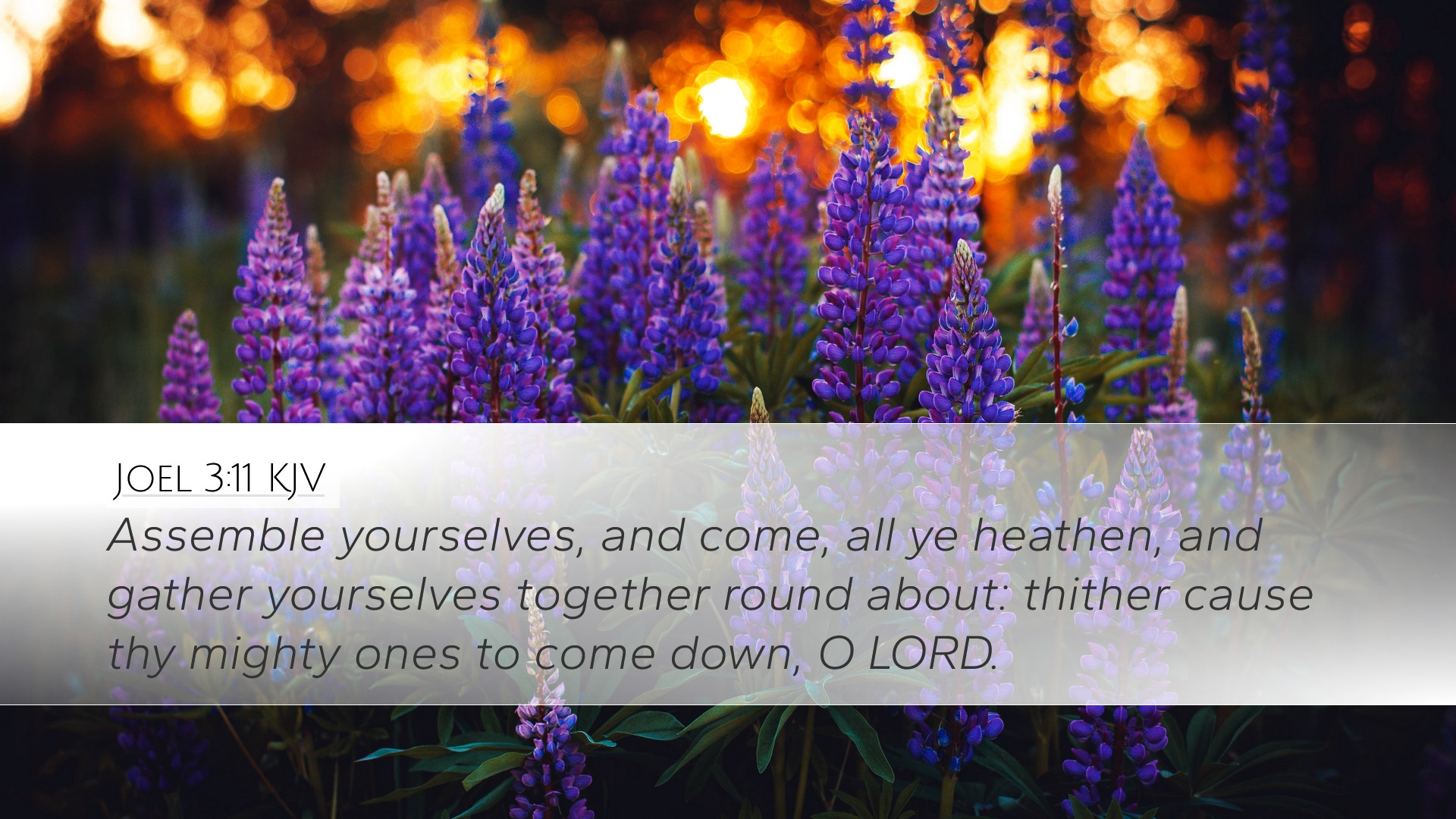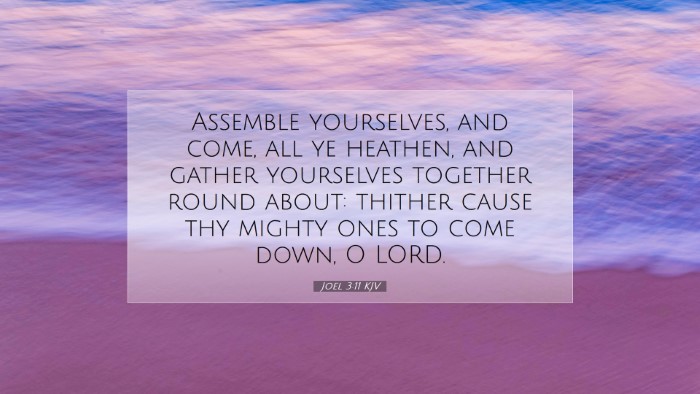Old Testament
Genesis Exodus Leviticus Numbers Deuteronomy Joshua Judges Ruth 1 Samuel 2 Samuel 1 Kings 2 Kings 1 Chronicles 2 Chronicles Ezra Nehemiah Esther Job Psalms Proverbs Ecclesiastes Song of Solomon Isaiah Jeremiah Lamentations Ezekiel Daniel Hosea Joel Amos Obadiah Jonah Micah Nahum Habakkuk Zephaniah Haggai Zechariah MalachiJoel 3:11
Joel 3:11 KJV
Assemble yourselves, and come, all ye heathen, and gather yourselves together round about: thither cause thy mighty ones to come down, O LORD.
Joel 3:11 Bible Commentary
Commentary on Joel 3:11
The verse Joel 3:11 reads: "Assemble yourselves, and come, all ye heathen, and gather yourselves together round about: thither cause thy mighty ones to come down, O Lord."
This verse is a call to the nations, a summons for the Gentiles to gather, illustrating God's sovereignty over all mankind and His authority to judge the nations. In understanding this verse, we can draw from the rich insights provided by esteemed public domain commentaries.
Context and Background
Joel prophesies during a time of locust plague and impending judgment, urging repentance and preparation for God's coming judgment. This specific verse appears in the context of God's promise to restore Israel and His ultimate plan for justice among the nations.
- Setting: The backdrop of Joel is one of calamity for Israel, where the physical devastation serves as a metaphor for spiritual desolation.
- Theme: The overarching theme is one of divine retribution intermingled with hope for restoration, prevalent in the prophetic books.
Insights from Matthew Henry
Matthew Henry elaborates on the importance of assembling the nations for judgment, pointing out that the calling of the Gentiles is indicative of God's universal reign. In his remarks:
- Henry notes that this assembly of the nations will ultimately lead to a confrontation with God’s might, showcasing His power in the face of human defiance.
- The "mighty ones" refers to the heavenly hosts or angelic beings, invoking the image of divine warriors who will enforce God's will.
Henry emphasizes the urgency and gravity of the call, underlining that God’s might is to be acknowledged among the whole earth.
Insights from Albert Barnes
Albert Barnes offers a theological exploration of this verse, marking it as a pivotal point in God's plan for restoration. In his commentary:
- Barnes highlights that the "Heathen" represent not only the nations surrounding Israel but signify all those outside God’s covenant.
- He points out that the verse can be understood as an invitation to witness God's divine justice and power.
- Furthermore, Barnes notes that the "mighty ones" coming down reflects the heavenly intervention necessary for God’s redemptive plan.
Barnes interprets this assembly as a preparation for the judgment that would come, relating it to the eschatological expectations within the prophetic literature.
Insights from Adam Clarke
Adam Clarke provides a practical and historical perspective on Joel 3:11, connecting its intentions to both ancient and contemporary audiences. His insights include:
- Clarke explains that calling the Gentiles to assemble indicates a time when all nations will stand before God’s judgment seat.
- He emphasizes the strength of God's might as a theme throughout scripture, suggesting that humanity’s bestlaid plans ultimately fall short against divine authority.
- With an eye toward ecclesiology, Clarke also points out that this serves as a foreshadowing of the great commission to spread the gospel to all nations.
Clarke's interpretation inspires readers to consider the implications of God’s justice in both historical and future contexts.
Theological Implications
The implications of Joel 3:11 are profound for understanding God's nature and His covenant with humanity. Several key takeaways for pastors, theologians, and students emerge from this analysis:
- God's Sovereignty: The assembly of nations reflects God's ultimate authority over all creation and His unfailing intention to judge justly.
- Universal Call: The inclusion of the 'heathen' signifies God's desire for all peoples to come to Him, highlighting the expansive nature of His grace.
- Judgment and Hope: While the verse speaks to impending judgment, it also carries a semblance of hope for restoration, a consistent theme in prophetic literature.
- Role of the Church: The directive to gather all nations can be paralleled with the church's mission to evangelize and prepare people for Christ’s return.
Application for Today
Understanding Joel 3:11 carries significant implications for believers today. It challenges us to reflect on the following areas:
- Awareness of God’s Call: As the church, we must heed the call to declare God’s righteousness and His impending judgment against injustice in the world.
- Preparation for His Return: The urgency in the verse prompts believers to remain vigilant and equipped for Christ’s second coming.
- Engagement with the Nations: The verse serves as a reminder of the Great Commission’s relevance, motivating believers to reach out to all cultures and peoples.
In conclusion, Joel 3:11 serves not only as a historical proclamation but as a timeless message that resonates deeply with the overarching narrative of Scripture—God’s relentless pursuit of humanity, His righteous judgment, and the promise of restoration.


